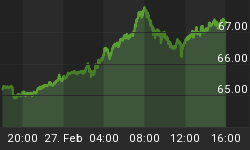Gold continues to consolidate between $700/oz and $760/oz and looks set to rechallenge $800/oz in the coming days as safe haven buying reemerges on continuing concerns regarding the global financial system and economy.
Gold was down marginally yesterday (some 1%). It surged after the Bank of England's massive interest rate cut of 150 bps but more counterintuitive trading was seen as gold was aggressively sold by US investment banks on the COMEX who did not appear to want to see gold surging above $760/oz and aggressively defended this position.
All eyes will be on the US non-farm payrolls report which is out at 13:30 GMT. It is expected to be down 200k which could result in equity and commodity markets coming under further pressure.
Equities and Commodities Tumble - Gold Decoupling?
Gold is continuing to decouple from energy, base metal and soft commodities which all fell sharply again yesterday (WTI $Dec down another $4.53 to $60.77 and the CRB Commodities Index fell another 10.87 to 261.87). Indeed it is notable that commodities and equities are increasingly correlated while gold seems likely to be in the early stages of decoupling from equities and commodities. In recent years, there has been a recurring pattern of gold being correlated with equities in the very short term but to be uncorrelated over the medium and long term (as per our Performance Table).

With equities and commodities selling off sharply on fears of a sharp and protracted global recession it seems likely that equities and commodities may become more correlated in the short term and possibly even the medium term.
Neither equities or commodities have gold's monetary and safe haven qualities and this is why gold is likely to vastly outperform both in the coming months.
Dollar to Come Under Serious Pressure in Coming Months
This is especially the case as the reserve currency of the world is likely to come under serious pressure again in the coming months. The dollar's strength of late has been quite impressive with significant gains against most fiat currencies, especially the other major currencies the euro and the pound. But given the terrible and deteriorating fundamental fiscal position of the US and the huge trade and current account deficits and the rapidly deteriorating budget deficits the dollar will again come under pressure once this period of massive global deleveraging is over. Trillions of dollars of US dollar denominated debt had to be paid back in recent weeks in a massive and unprecedented deleveraging of the financial system and this contributed to massive short covering and the significant rally seen in the dollar.
It is worth remembering that the dollar rose sharply in the 4 months after the geopolitical crisis that was the September 11th tragedy. Thereafter it fell, with intermittent bear market rallies, for the next 7 years. Similarly the global financial crisis has seen a sharp rise in the dollar (from oversold levels) but this is very likely a brief correction in a secular bear market for the dollar.
With central banks slashing interest rates to historically low levels, savers are again being punished and the opportunity cost of holding gold continues to decrease. Gold's critics use the fact that it does not yield anything as a simplistic criticism of gold. It does not yield anything as it is no one else's liability and is not dependent of the performance of corporations, banks and governments. Thus it has no counterparty risk and does not have to offer a yield to compensate for these risks.
Savers internationally are increasingly confronted with negative real interest rates and continuing systemic risk which is likely to rightly lead to increasing diversification into gold.















